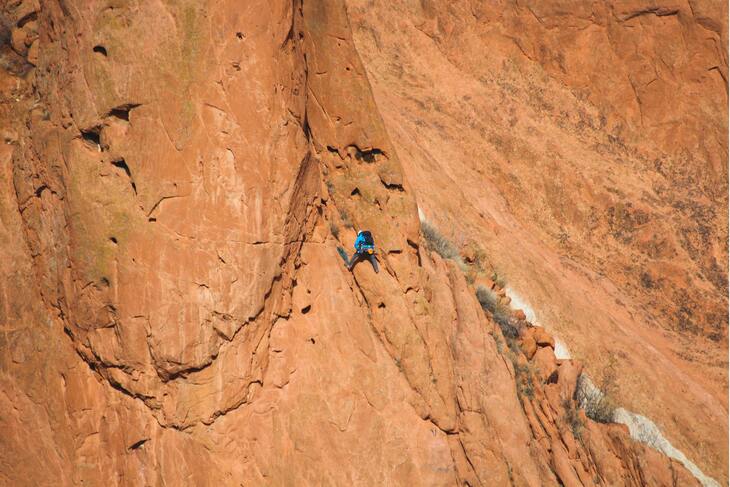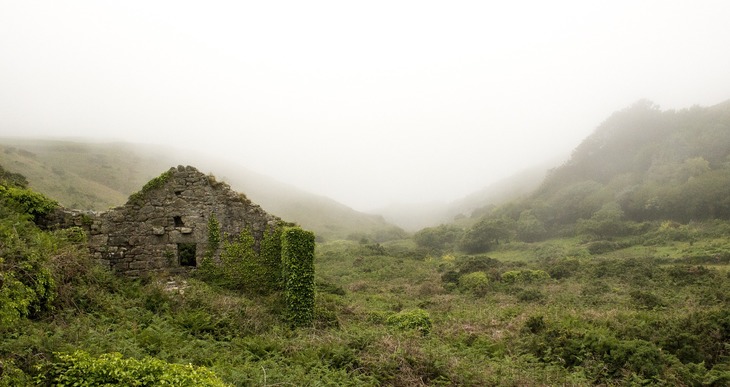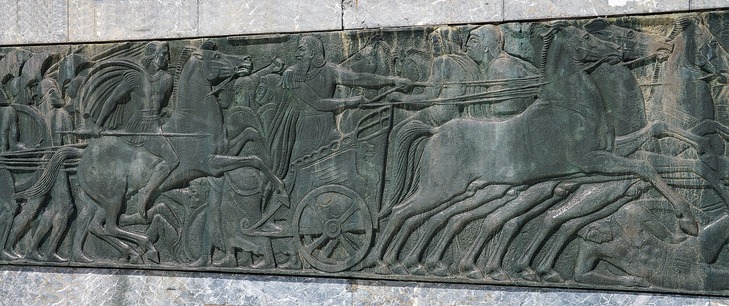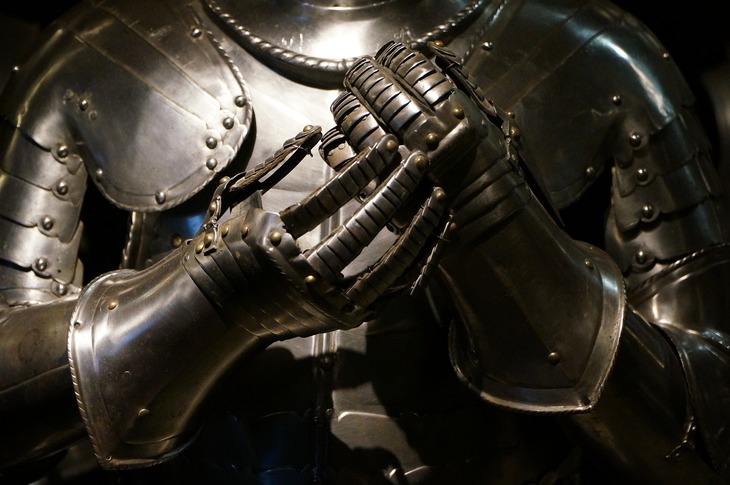The Dwarves have taken to their defense with a destructing power by decapitating the guarding monument to break the path to their gate making it a bit more difficult for the gathering enemies to enter their reclaimed kingdom. On the opposite side Bard and Thranduil take to an impromptu Council with Gandalf.
Failed council
Gandalf: “Since when has my council counted for so little? What do you think I’m trying to do?”
Thranduil: “I think you are trying to save your Dwarvish friends, and I admire your loyalty to them. But it does not dissuade me from my course. You started this, Mithrandir. You will forgive me if I finish it. Are the archers in position?”
Feren: “Yes, my lord.”
Thranduil: “Give the order. If anything moves on that Mountain, kill it. The Dwarves are out of time.”
Though he came in time to stop the attack on the Dwarves, his council does not matter much. It reminds me of the same reception his council received in Rohan and Gondor. Though he was always proven right, no one seems to believe or trust his opinion. It seems a bit foolish of Thranduil to think that Gandalf would conjure a story of an oncoming army of Orcs just to dissuade him from attacking his friends.
Nevertheless, this seems to be his position. It is obvious that Gandalf’s position as Middle-Earth emissary has either been forgotten or trivialized. Either way, Thranduil moves forward with his mission to kill whatever may move on the mountain.
Bilbo emerges
Gandalf: “Bowman! Do you agree with this? Is gold so important to you? Would you buy it with the blood of Dwarves?”
Bard: “It will not come to that. This is a fight they cannot win.”
Bilbo: “That won’t stop them. You think that Dwarves will surrender? They won’t. They will fight to the death to defend their own.”
Gandalf: “Bilbo Baggins.”
Having lost confidence in changing Thranduil’s mind, Gandalf focuses his attention on Bard. He desperately tries to make the case for the Dwarves presenting them as victims who would die because of their greed. Gandalf presents the right case for the Dwarves, however, Bard still thinks that despite his ally’s archers in position and the command to kill in place, the Dwarves would somehow back down.
Thankfully, Bilbo emerges precisely at this moment to tell him that this will not be the case. He knows very well the extent that Dwarves will go to to protect their reclaimed homeland and their treasure.
King’s ransom
Thranduil: “If I’m not mistaken this is the Halfling who stole the keys to my dungeons from under the nose of my guards.”
Bilbo: “Yes. Sorry about that. I came to give you this.”
Thranduil: “The Heart of the Mountain. The King’s Jewel.”
Bard: “And worth a king’s ransom. How is this yours to give?”
Bilbo: “I took it as my 14th share of the treasure.”
It is apparent that Thranduil still holds a grudge toward Bilbo for stealing the keys and releasing the Dwarves from his dungeons. Had he not done so and been incarcerated himself, the Dwarves would have never reached the Lonely Mountain, given the stubbornness Thorin expressed in succumbing to a deal.
Though initially embarrassed to be in the company of the Elf he wronged, Bilbo quickly moves on to his main point, presenting the Arkenstone. He ingeniously presents it as the share of the treasure he himself is entitled to with a binding contract he signed with the Dwarves.
It is obvious to everyone present in the tent what the intention behind the giving of the jewel is, and what it can do for the Dwarves as well as for the Men. Though Bilbo might have appeared insignificant when they first laid eyes on him, through the acquisition of the Arkenstone, he now stands as a person of interest amidst Elves, Men, and a Wizard.
No loyalty owed
Bard: “Why would you do this? You owe us no loyalty.”
Bilbo: “I’m not doing it for you. I know that Dwares can be obstinate and pig-headed and difficult. They’re suspicious and secretive with the worst manners you can possibly imagine but they’re also brave, kind and loyal to a fault. I’ve grown very fond of them, and I would save them if I can. Now, Thorin values this stone above all else. In exchange for its return, I believe he will give you what you are owed. There will be no need for war.”
It is interesting to note that Bard, as probably Thranduil and Gandalf, thought that the Arkenstone was there to help them secure their share in the treasure of Erebor. Although Bilbo does not technically owe loyalty to any particular race, they immediately thought he was there to honor and aid them. The initial gladness over this notion wears instantly off as Bilbo explains specifically why he still stands behind the Dwarves.
For all that he has experienced with them, the good, the bad and the ugly, he is still loyal to them, despite his actions proving otherwise. The fact that he would bring the Arkenstone to the Dwarves’ enemies just to help his friend Thorin not to succumb completely into madness, is loyalty of the highest order, one not easily depicted on the surface.
We can see that Bilbo feels guilt over what can be perceived as a betrayal of the Dwarves, however, his intention is honorable, one based purely on love and friendship he feels for the Dwarves, one worth more than all the gold in Erebor.
Rest before leaving
Gandalf: “Rest up tonight. You must leave on the morrow.”
Bilbo: “What?”
Gandalf: “Get as far away from here as possible.”
Bilbo: “I’m not leaving. You picked me as the 14th man. I’m not about to leave the Company now.”
Rightfully, Gandalf orders Bilbo to leave Dale and Erebor and head out for the Shire. There is nothing for him here anymore. His duty as the burglar of the company has been successfully accomplished. He can leave without guilt or shame. What they contracted him for, he delivered, and then some.
However, it appears that Bilbo is loyal to a fault as well. I would say that his want of owning to his actions and taking responsibility for them is as much of a motivator for him as anything else.
It would pain him to know that any member of the company has come to harm because of his decision to take the Arkenstone to the enemy. It is worrisome enough for Thorin to suspect his kin for stealing and hiding the jewel from him. If he left, Thorin in his madness would probably find another scapegoat for this turn of events and someone else would come to harm because of him.
A different kind of courage
To face an enemy in battle demands a certain kind of courage that comes rushing in at the same time as the fight instinct is activated. One has to defend oneself if one wants to live. Therefore, it comes almost automatically.
However, to face the betrayed party and admit to having purposefully wronged them is another kind of courage altogether, one certainly not found in everyone. Though we are taught to accept responsibility for our actions, it is a road not readily taken.
Though Bilbo’s cause is just and done with good intentions, there is no possibility that Thorin will see it the same way, not even if Bilbo explains his reasoning to him. For that Thorin is already too far gone.
Repercussions of Bilbo’s act
Gandalf: “There is no company. Not anymore. Imagine what Thorin will do when he finds out what you’ve done.”
Bilbo: “I’m not afraid of Thorin.”
Gandalf: “Well, you should be. Don’t underestimate the evil of gold. Gold over which a serpent has long brooded. Dragon-sickness seeps into the hearts of all who come near this Mountain. Almost all, heh.”
Gandalf has certainly no reservations when it comes to the repercussions of Bilbo little act of bravery. He knows exactly what awaits him if he returns to Erebor which is why he orders him away. Gandalf is also right in pointing out that there is no company to speak of.
Thorin is on one side and all the others on the other. Though they are loyal to their leader, they do not support his every decision or condone his behavior. Nevertheless, they would never leave his side.
Though he should be afraid of Thorin, Bilbo seems not to be. He knows Thorin’s character and has seen him rise and fall. He knows what might await him and is not afraid to face his judgment, no matter how harsh it might be.
The influence of gold
Gandalf warns Bilbo again of the sickness, as did Balin in Erebor, but that does not seem to change his already decided mind to return to his company. And apparently Gandalf was wrong, not everyone is affected by the dragon-sickness of the Mountain.
Though it was initially said it would only influence Thorin given his family’s history with the gold, the danger of the same fate Gandalf now posed on everyone else who comes into contact. That would mean that the whole company should be under the same influence, however, they are not and neither is Bilbo.
It may be reasoned that other Dwarves and races would succumb to the same poison of gold if they were exposed to it for a longer period of time. But that is only for us to hypothesize. We know what happens to Bilbo and Frodo with the Ring over time, and though not nearly the same thing, there is nevertheless validity in thinking that this gold would perhaps influence him in some way.
Babysitter
Gandalf: “You there. Find this Hobbit a bed and fill his belly with hot food. He’s earned it. Hey. Keep an eye on him. If he should try to leave, you tell me.”
Alfrid: “Move it! Stupid Hobbit.”
Seeing the decisive and loyal disposition of Bilbo, Gandalf orders Alfrid to keep a close look on the Hobbit so he doesn’t wander off. To his displeasure Alfrid takes Bilbo with him to do what Gandalf has ordered him. It seems Alfrid enjoyed his former Master better than Bard or Gandalf.
With the Master of Lake-town there was nothing to do but spy, falsify documents and enjoy his own perceived wealth he shared with the Master. Now, he has to take orders for menial duties that seem to be below him.
Follow me to my next post.
Featured image by Alexis Gethin on Unsplash





